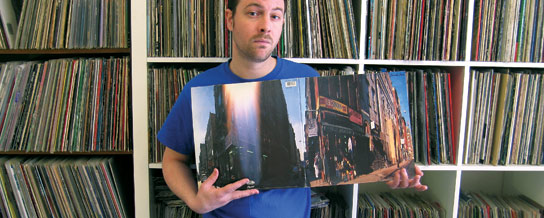Xrabit on Paul’s Boutique
German hip-hop producer Xrabit finds hope in the form of The Beastie Boys’ not-so-instant classic […]

Xrabit on Paul’s Boutique
German hip-hop producer Xrabit finds hope in the form of The Beastie Boys’ not-so-instant classic […]

German hip-hop producer Xrabit finds hope in the form of The Beastie Boys’ not-so-instant classic Paul’s Boutique.
Summer 1989. I was 14, and coasting through a hot Munich summer of graffiti, parties, and booze. I was already obsessed with hip-hop culture—the soundtrack to our lives was a mixture of RUN-DMC, Public Enemy (It Takes a Nation of Millions to Hold Us Back only came out the year before), and, of course, De La Soul’s huge 3 Feet High and Rising.
But even in a year when hip-hop was in such amazing health—opening up, expanding, and diversifying in every direction—Paul’s Boutique exploded into our lives like nothing else.
It was late July and I was at my friend Ivan’s, slumped on his sofa. We spent whole afternoons drawing, bitching about sprayer rivals, talking about all the girls we’d never get, and listening to music. We’d both loved Licensed to Ill, so of course we had to get the new Beasties as soon as it came out. The slinky opening track—calling out “To All the Girls” like we wished we could—was cool, but then, with no warning, the needle gets the shakes as the bass of “Shake Your Rump” rips through the speakers. We couldn’t believe what we were hearing. We were immediately sold.
The beats on Paul’s Boutique were so much more musical than any other hip-hop we’d heard; the production pioneered a dense usage of samples from a wildly eclectic range of sources—from The Beatles to the Jaws soundtrack, through a dizzying cut-up smorgasbord of funk, jazz, and Zeppelin. There was no effective law in place yet to prevent people from helping themselves to music from all over like that. It would be another couple of years until Biz Markie got sued by Gilbert O’Sullivan in a landmark case that’d change hip-hop production forever… but that’s another story.
As well as the Dust Brothers’ killer production, the lyrics are similarly jam-packed with characters, stories, name-drops, and jokes, making the LP so rich in detail it felt like you noticed something new every time you played it.
At first the album flopped. Critics didn’t quite know what to make of it and fans were expecting another License to Ill party record—this was way more rich and strange, in a way. The Beastie Boys reportedly even went as far as saying they wanted to make a record without a hit single.
Listening to it now, with its 20th anniversary reissue imminent, and its position as an acknowledged classic safely secured, it’s hard to believe that it was ever shunned as the runt of the litter. It was such a trailblazing LP—so ahead of its time that it still sounds totally fresh today. We didn’t know we were listening to a future classic; we just knew we had a new soundtrack to the rest of the summer, and proceeded to watch that needle shake, look at the great (nearly) 360-degree view of a cool Manhattan street, and dream of being there and being confident enough to shout out “Hey Ladies” and not get laughed at.
If these three skinny white boys could pull it off, there was hope… even for us.

